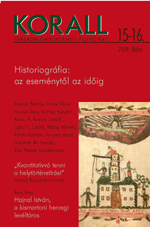Historiográfiai viták a testamentumról
Testaments as Resources: Historiographical Debates
Author(s): Mónika MátaySubject(s): History
Published by: KORALL Társadalomtörténeti Egyesület
Keywords: Hungary; social history; historiography; testaments; research of testaments: international overview
Summary/Abstract: In the past few decades the overwhelming majority of historical research studying testaments followed quantitative methods. The leading British, French, and American scholars of the field fashioned themselves in robust examinations and applied a systematic statistical approach to last wills. Among others, Wilbur Kitchner Jordan, Michel Vovelle, Pierre Chaunu, Jacques Chiffoleau, and Samuel K. Cohn categorized and counted charitable giving as found in the testaments in order to investigate pious practices. They argued that registering shifts in the patterns of pious activities indicated longue durée or sudden mental changes among the testators. They provided a powerful model, which exhibited that measuring religious attitudes was actually feasible and a fruitful scientific enterprise. Other historians pointed out the scantiness of serialized methods and drew attention to a number of problems a quantitative historian has to face with when translating the narrative archival sources into a column of figures. They challenged and harshly criticized the practice of recording masses of data, homogenizing a unique and individualistic historical source, and most importantly, expressed deep-seated skepticism towards decoding secularizing attitudes. They proposed an alternative reading and understanding of the testament and suggested more qualitative methodology. After reviewing the potentials and limitations of the various inquiries, the author reveals her own experiences as a historian who also devoted herself to the exploration of testaments. Finally, she elucidates the advantages of integrating last wills into individual life stories, reconstructing the historical accounts of one’s past actions and biographical details, and putting personal records into the center of historical analysis. Meticulous microscopic scrutiny does not only allow the historian to reconstruct biographical tales that, unquestionably, hold amazingly imposing fictional qualities, but also leads us into an impressively vivid arena of legal conflicts stirred by ambiguous final decisions.
Journal: Korall - Társadalomtörténeti folyóirat
- Issue Year: 2004
- Issue No: 15-16
- Page Range: 248-270
- Page Count: 23
- Language: Hungarian

